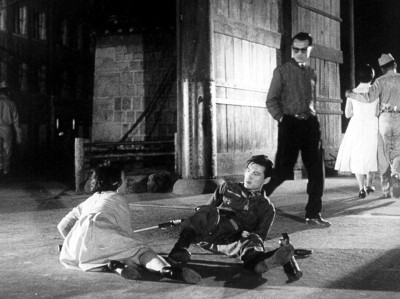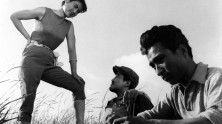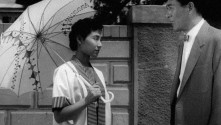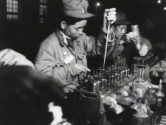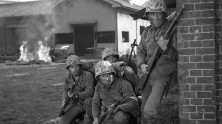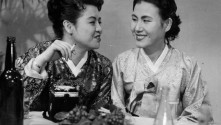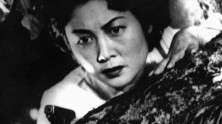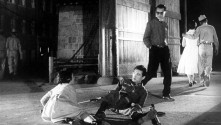
The Flower in Hell
(Chiokhwa)
With Choi Eun-hee, Kim Hak, Jo Hae-won.
South Korea, 1958, DCP, black & white, 87 min.
Korean with English subtitles.
DCP source: Korean Film Archive
One of the most versatile film directors in Korean history, Shin Sang-ok won both commercial success and international critical acclaim. In addition to directing 75 films of almost every genre possible, Shin established a production company, Shin Film, that dominated the Korean box office in the 1960s; spearheaded joint production with Hong Kong film studios in the 60s and 70s; and had a dramatic, temporary career of producing films in North Korea after being kidnapped in 1978.
With The Flower in Hell, Shin’s expertise in diverse genres and film traditions brilliantly converge to envision the heterogeneous landscape of postwar South Korea. Unlike the majority of contemporary films that feature the bustling landscape of reconstructed Seoul, the South Korea of The Flower in Hell, which was filmed at an actual US Army base, is desolate. The plot pivots around Sonya, a prostitute who creates a love triangle with two brothers. An intensely sexualized figure, Sonya destroys the brotherhood by seducing her lover’s younger brother Tong-sik. The point-of-view shots mostly represent the innocent perspective of Tong-sik, who has only lived in the countryside and feels disoriented in his first visit to Seoul and its suburban area Dongducheon. Tong-sik’s experience of Sonya’s dangerous charm can be read as an analogue of Koreans’ ambiguous feelings towards their postwar landscape in reconstruction under the US-led Cold War bloc.
Shin’s integration of documentary footage—such as that of a marketplace and a ball with dancing soldiers, their lovers and performers—in tandem with on-location shooting, speaks to an Italian neorealist approach. And yet, as scholar Steven Chung points out, the melodramatic spectacles of the train chase and climactic final battle attest to the film’s heterogeneity rather than its attachment to a single artistic tradition—with this unevenness an allegory for the postwar pandemonium. Expanding Chung’s interpretation, the strategic hodgepodge of genres is a critical lens through which we can grasp the visual economy of a postwar South Korea built through cinema and questioning the place of the US within it.
One of the most important films made during the Korean War, Nakdong River was considered lost for years and was only recently rediscovered by the Korean Film Archive. Digitally restored from a 16mm print in remarkable condition and reunited with an original soundtrack properly attributed to Korea’s renowned composer Yun I-sang, who used it as the basis for a larger symphony, itself only discovered in 2017. The film was originally produced by Moomyung Film Research—founded by photographer Kim Jae-moon—and the Folk Culture Research Association organized by artists based in Busan, with the support of the Gyeongnam Provincial Government in 1951. Despite its propagandistic purposes, Nakdong River contains an unusually experimental, lyrical style as it flows along the path of the poem by Lee Eun-sang on which it is based, ending and beginning with the miraculous choral piece by Yun I-sang who also incorporated Lee’s lyrics. Opening with a scene of a woman (Cho Yong-ja) dancing along the water, this “semi-documentary” synthesizes a fictional story about a man returning to his hometown after college, with rare footage of life along the Nakdong River and of the war itself. – adapted from text by Chung Chonghwa, “Nakdong River, A Symphonic Poem That Heals the Wound of the Korean War,” The 27th Busan International Film Festival Newsletter 35 (2022)

